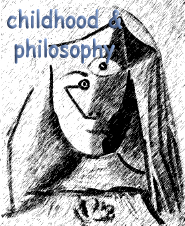the conundrum in the collective indian psyche regarding teaching philosophy in schools
DOI:
https://doi.org/10.12957/childphilo.2020.53518Keywords:
philosophy and childhood, yoga and meditation, Patanjali, Indian philosophy, Lipman,Abstract
India now constitutes approximately 17% of the world’s population and has a high proportion of younger people. Philosophy for school children aims to create better citizens of the future. In this article, I establish the need to teach philosophy to children in schools, especially in India. Subsequently, I discuss the readiness of Indians to accept philosophy in the school curriculum, their conundrum in understanding the need for philosophy in a school setting, and the East-West dilemma concerning the teaching of philosophy in schools. The concept of self-realization is important in education. Socrates claimed that an unexamined life is not worth living. However, the self-realization concept of the West differs from that in India. While the former perceives self-realization as a way to construct a good individual, the latter has always emphasized the cessation of the individual and focused on the incomprehensible truth human languages cannot capture. Western philosophy is concerned with questioning, inquiry, and the problems of philosophy. The East is concerned with bringing such questioning to an end. Matthew Lipman focuses on increasing curiosity, accelerating the thinking process, teaching logic and formal reasoning, and the intellectual enhancement of children. Indian philosophy, yoga, and meditation are all concerned with the cessation of consciousness. The key question concerns the approach one may choose to adopt in teaching philosophy – accelerating or decelerating the thought processes of children? Indian parents are the primary decision-makers in their children’s education, and sometimes throughout their careers and lives. Unless clarity emerges in the Indian and global community regarding this issue, there is no clear starting point for teaching philosophy to children in India. This article aims to raise critical awareness among global citizens regarding this conundrum in the collective Indian psyche. Unless the world’s psyche is inserted into the place of the Indian psyche, the great barrier between the West and the East regarding philosophy in the school curriculum cannot be bridged.
Downloads
References
References will be provided as required and when intimated from Amrita School of Education, Amrita Vishwa Vidyapeetham, Mysuru Campus, India.




